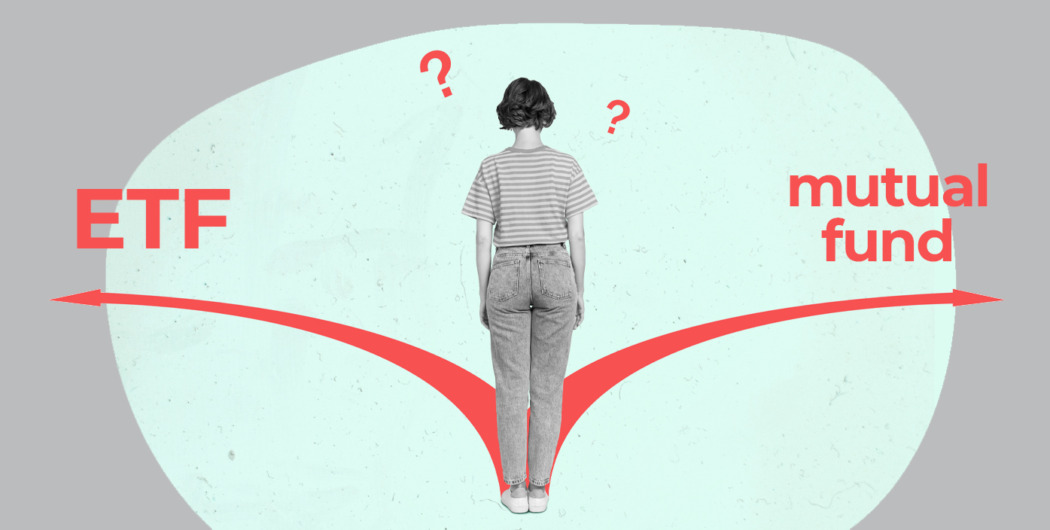

If you’re not investing in the stock market, it’s time to fix it! A properly assembled portfolio of securities will not only help to save what you’ve accumulated, but also to provide you with additional income from diversified sources. Investing isn’t difficult if you know where to put your money.
One of the most reliable instruments at the moment are funds. Let’s figure out what’s the difference between a mutual fund and exchange-traded fund and find out what is more profitable in the market now! There are several times more mutual funds than ETFs on the market competing for your investments, so let’s see which is more appropriate in your situation.
Mutual funds
A mutual fund is a form of collective investment that allows an investor or a shareholder to become the owner of a fund’s share, thereby gaining access to its portfolio.
The main task of the fund manager is to invest the shareholders’ funds in a certain portfolio of securities. The choice of assets in the portfolio is determined by the goals and strategy of the fund. For example, for a fund whose purpose is to ensure minimal risk at a given yield, fixed–yield instruments are suitable.
It’s customary to distinguish two main types of mutual funds: open (Open-End Fund) and closed (Closed-End Fund).

The closed-end fund has a limited number of issued units (shares) that became available after its first public offering. They are traded on global stock exchanges at a price that may differ from the net asset value (NAV) per share. The price depends on the ratio of supply and demand in the market and the main indicators of the fund itself.
Most mutual funds are open-ended. They have no restrictions on the issuance of new shares and are available to all investors. An open mutual fund issues new units based on the current net asset value (NAV) and repurchases the units that the investor has decided to sell.
What is an ETF?
An ETF is an exchange-traded fund that tracks an index, bonds, precious metals, or other assets.
Exchange-traded funds allow you to invest in many assets in one swoop, for example. You can also invest in bond indices, REITs, broad market indices, or, conversely, individual industries (for example, invest in biopharmaceuticals or the oil industry).
An investment fund buys a large diversified portfolio of assets and then sells it in parts. To do this, the fund issues its own shares. That is, by buying one share of an ETF, an investor invests money in several attractive instruments at once.
You can earn money on an ETF as follows:
- purchase, — investment in a broad stock market, a separate country or group of countries, an economic sector or industry, or a group of assets;
- buying dividend ETFs;
- short sale;
- buying “volatility” — this fund is based on an index consisting of short-term VIX futures, so it doesn’t always exactly repeat the movements of the VIX index itself.
In general, an ETF is a very convenient and important tool for an investor. It allows users to diversify and protect all invested funds.
What’s the difference between ETF and stock?
Despite the presence of some similarities, these two tools are different in the following points:
- Diversification. By buying 1 share of a fund, you acquire tiny shares of all the shares owned by this fund. Thus, the bankruptcy of one of the companies does not threaten you with the loss of all your funds.
- Method of ownership. Unlike ordinary shares, you don’t own shares of a company directly. You won’t be able to participate in voting and shareholder meetings.
- Commissions. Exchange-traded funds charge a certain management fee. For large funds, it’s usually small, but it is still present. For example, the commission may be 0.1% per annum.
- Purchase of mutual funds is only possible at the closing of a trading day at its net asset value, while ETFs are available for intra-day trading.
ETFs are great for investors who don’t want to overtake the market. The selection of individual stocks requires certain experience and skills from the investor, but at the same time, such a portfolio can yield much more than the market average.

Which is right for you?
ETFs and mutual funds have quite a bit in common, but there are many different points in there as well. By understanding all of these differences and keeping an eye on your goals, you should be able to decide which option works best for you.
When to use ETFs
ETFs are beneficial if used in specific circumstances. Here is when you should consider investing in them:
1. You value tax efficiency
If you invest in things such as a brokerage account that is taxable, ETFs offer more control over the capital gains. Bear in mind that this doesn’t apply to a retirement account, where the tax advantages make it moot.
2. You want low-cost exposure
ETFs offer exposure at low costs within a niche, without you having to research the companies belonging to it. You could gain this sort of exposure using mutual funds as well, but the tax advantages will not be as good.
3. You are trading actively
ETFs can be traded in the same way as stocks, which is a good thing if you like to use margins or limit/stop-limit orders. This is an option that becomes unavailable to you if you decide to work with mutual funds.
4. You plan to change brokers
If you have the mind to change your brokers in the future, then ETFs may be a better choice for you. ETFs are often transferred from one broker to another with ease. However, if you hold mutual funds, you will have to close your positions. You will then need to reinvest so that your proceeds fit into the mutual fund of the new broker.
When to use mutual funds
Depending on your investment needs, mutual funds may be more advantageous to you than ETFs. Here is when you may want to consider mutual funds for your investments:
1. A similar ETF is not traded as much
If an ETF has limited liquidity, it could mean that the bids or ask spreads are quite large. As a result, you would need to pay a significant premium that goes above the net value of the funds. Since mutual funds get their price from their net asset value, this can bring you a profit.
2. You don’t invest in highly traded markets
The more an asset gets traded, the higher the risk it won’t be managed efficiently. For this reason, if you plan on investing in less-expensive market parts, you may benefit more from using mutual funds.
If the funds are actively managed, there is a better chance that they will outperform. Indeed, a high-traded market can also be very efficient. That being said, if a specific sector has a smaller trading volume, then you are much more likely to benefit from good strategy and management research. This is because they will have a more controlled management.
3. You wish to perform through active management
ETFs that are actively managed can still be found on the market, but there are very few of them, and very difficult to find. The majority of ETFs are simply index funds, which aim to mirror the market return.
If you want to outperform this index, active management is required. Mutual funds are often a good alternative for this. Bear in mind that mutual funds often have higher taxes and fees. This means that even if you adopt active management, outperformance is not always guaranteed.
Are ETFs riskier than mutual funds?
Generally speaking, both ETFs and mutual funds are seen as low-risk investments – at least when you compare them to stocks and bonds. They are constructed slightly differently, but in terms of risks, they are virtually the same. If the assets are the same, there is no reason to think one is riskier than the other.
The only factor that can make a difference here is the holding itself. If the company you are investing in is not exactly reliable or on its feet, you may risk your funds in the investment. This applies to any other investment, whether it’s a stock, bond, crypto, or more.
Do Index ETF and mutual fund fees differ given the same passive strategy?
The differences in fees are marginal at most. Mutual funds have a slightly greater expense ratio compared to Index ETFs, but not enough to matter. For example, Vanguard’s S&P 500 ETF (VOO) figures an average expense ratio of 0.03%. That being said, the company’s mutual fund, Vanguard 500 Index Fund Admiral Shares (VFIAX), features an average expense ratio of 0.04%.
The fees may vary from one company to another. You will probably find one where the mutual funds’ fees are lower than the ETFs. As a result, we cannot say that one’s fees are more expensive than the other. Indeed, while mutual funds tend to go higher for the most part, they are usually around the same price.
Is investing profitable?
There’s a rule that every novice investor needs to accept: the higher the potential return, the higher the risk. Those who are just entering the market often begin to evaluate assets by determining their profitability. But such a method can lead to a decrease in capital or even a complete loss of it.
Investing, of course, is profitable, but only in cases when the client clearly knows the nuances of the market and understands all the details.
Investments are an opportunity to make your money work for you and generate additional income. The main thing is to define a goal, study the rules of working with different assets, form a strategy, and stick to it, cutting off emotions!









